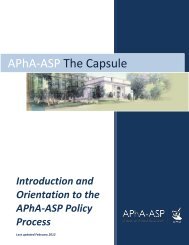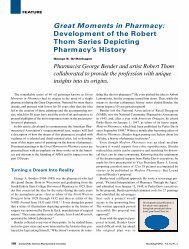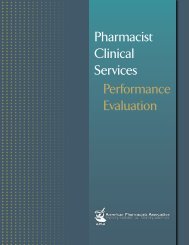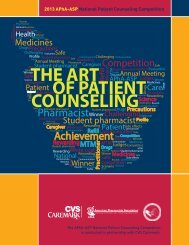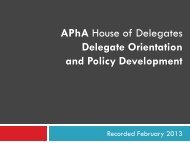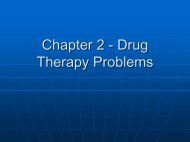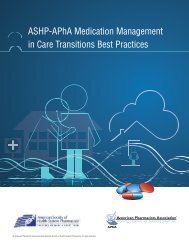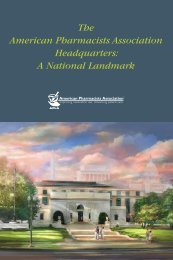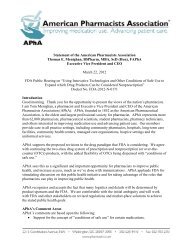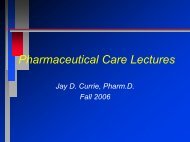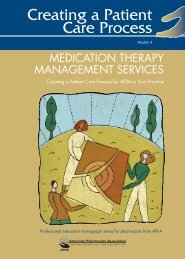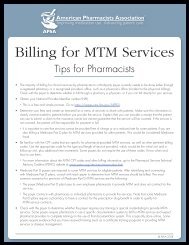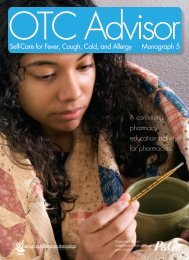Community Pharmacist Preceptor Education Program - Library
Community Pharmacist Preceptor Education Program - Library
Community Pharmacist Preceptor Education Program - Library
- No tags were found...
You also want an ePaper? Increase the reach of your titles
YUMPU automatically turns print PDFs into web optimized ePapers that Google loves.
APPENDIXAccreditation Council for Pharmacy <strong>Education</strong>Standard No. 14: Curricular Core—Pharmacy Practice ExperiencesThe college or school must provide a continuum of required and elective pharmacy practice experiencesthroughout the curriculum, from introductory to advanced, of adequate scope, intensity, and duration to supportthe achievement of the professional competencies presented in Standard 12.The pharmacy practice experiences must integrate, apply, reinforce, and advance the knowledge, skills, attitudes,and values developed through the other components of the curriculum. The objectives for each pharmacy practiceexperience and the responsibilities of the student, preceptor, and site must be defined. Student performance,nature and extent of patient and health care professional interactions, where applicable, and the attainment ofdesired outcomes must be documented and assessed.In aggregate, the pharmacy practice experiences must include direct interaction with diverse patient populationsin a variety of practice settings and involve collaboration with other health care professionals. Most pharmacypractice experiences must be under the supervision of qualified pharmacist preceptors licensed in the UnitedStates.Guideline 14.1<strong>Preceptor</strong>s should hold full, shared, adjunct, or other defined positions in the college or school and should be well versedin the outcomes expected of students and the pedagogical methods that best enhance learning. In this regard, thecollege or school must ensure that preceptors receive orientation, especially for first-time preceptors prior to assumingtheir responsibilities, ongoing training, and development. <strong>Preceptor</strong>s should provide close supervision of and significantinteraction with students. The student-to-preceptor ratio for the pharmacy practice experiences should be adequate toprovide individualized instruction, guidance, supervision, and assessment.Guideline 14.2When assigning students to preceptors and practice sites, the college or school should strive to avoid circumstances orrelationships that could adversely affect the student/teacher relationship and the desired outcomes.Guideline 14.3Students must not receive remuneration for any pharmacy practice experiences (introductory or advanced) for whichacademic credit is assigned. 1 Other work experiences in pharmacy settings for which no academic credit is awarded (i.e.,not a component of introductory or advanced pharmacy practice experiences) may be required for advancement in thecurriculum.Guideline 14.4 2The introductory pharmacy practice experiences must involve actual practice experiences in community and institutionalsettings and permit students, under appropriate supervision and as permitted by practice regulations, to assume directpatient care responsibilities. Additional practice experiences in other types of practice settings may also be used. Theintroductory pharmacy practice experiences should begin early in the curriculum, be interfaced with didactic course workthat provides an introduction to the profession, and continue in a progressive manner leading to entry into the advancedpharmacy practice experiences. The didactic course work itself should not be counted toward the curricular requirement ofintroductory pharmacy practice experiences.Guideline 14.5The organization of the advanced pharmacy practice experiences should provide a balanced series of required (themajority) and elective experiences that cumulatively provide sustained experiences of adequate intensity, duration, andbreadth (in terms of patients and disease states that pharmacists are likely to encounter when providing care) to enableachievement of stated competencies as demonstrated by assessment of outcome expectations. Generally, the requiredand elective experiences should be full-time, provide continuity of care, and be conducted under pharmacist-preceptorsupervision and monitoring.1A professional degree program in an institution that meets the definition and characteristics of “cooperative education” (www.co-op.edu) may apply to ACPE for a waiver of thisrequirement.2See Appendix C (Additional Guidance on Practice Experiences) in the ACPE Accreditation Standards and Guidelines for the Professional <strong>Program</strong> in Pharmacy Leading to the Doctor ofPharmacy Degree.26 APhA and NACDS Foundation



